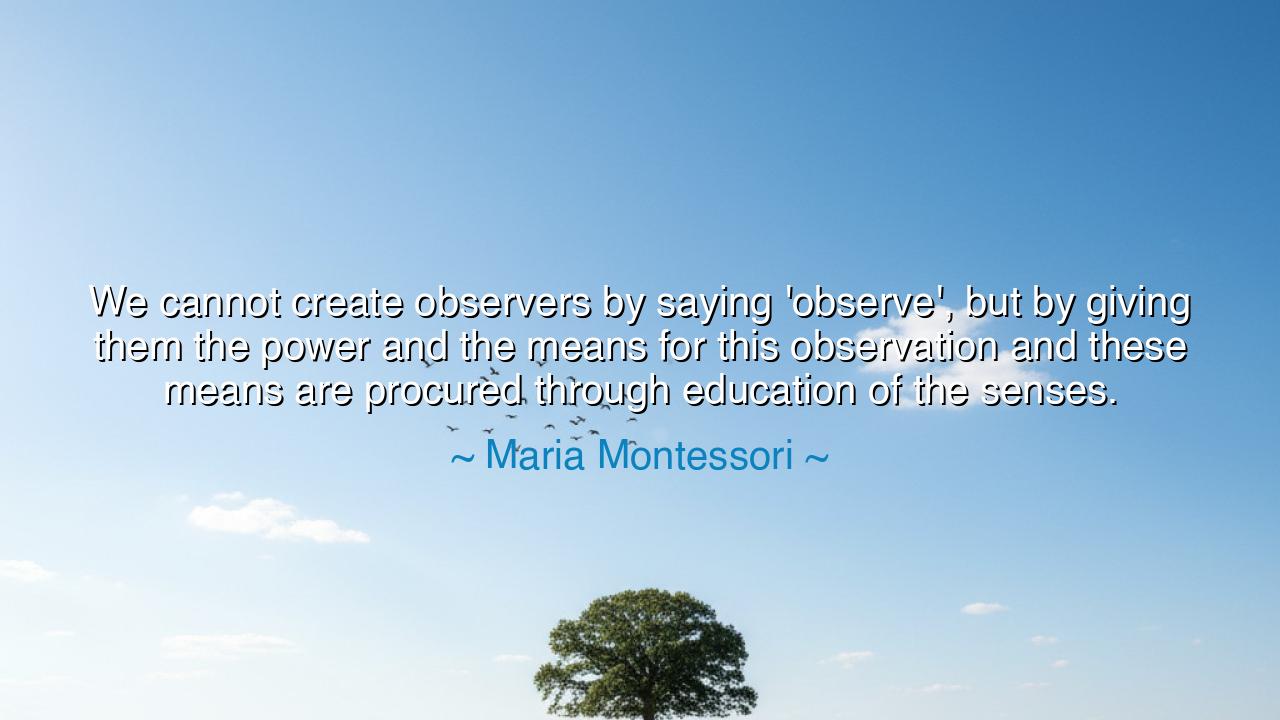
We cannot create observers by saying 'observe', but by giving
We cannot create observers by saying 'observe', but by giving them the power and the means for this observation and these means are procured through education of the senses.






The luminous thinker and educator Maria Montessori, whose name is synonymous with freedom in learning, once declared: “We cannot create observers by saying ‘observe’, but by giving them the power and the means for this observation; and these means are procured through education of the senses.” In this simple yet profound utterance lies an entire philosophy of awakening—the call to teach not through commands, but through cultivation. Montessori reminds us that the power to perceive does not come from instruction alone, but from the awakening of the senses, the refinement of attention, and the liberation of curiosity. For the mind cannot see what the heart has not first learned to feel, nor can a soul perceive truth unless its instruments of awareness are trained to discern it.
In her time, the world of education was bound in rigidity. Children were seated in rows like soldiers of obedience, their minds filled with words, their spirits starved of experience. To such a world, Montessori brought a revelation: that the child is not a vessel to be filled, but a flame to be kindled. She believed that every human being is born with an innate thirst to understand, but that this thirst must be nurtured through experience, through engagement with the living world. “Observe,” she says—but how can a child observe if his senses are dulled by monotony, if his environment offers no wonder to behold? Thus, she taught that to create true observers, one must first educate the senses—to let the eye delight in form and color, the ear in melody and silence, the hand in texture and weight, the heart in empathy and awe.
To understand her words, imagine the young Helen Keller, blind and deaf from infancy, locked in a prison of isolation. No command to “observe” could have reached her; no explanation could have awakened her dormant mind. But when her teacher, Anne Sullivan, placed Helen’s hand under a stream of water and spelled “w-a-t-e-r” into her palm, the door of perception opened. In that sacred moment, the education of the senses became the bridge between darkness and light. Helen did not learn through instruction, but through experience—through the awakening of touch, the baptism of understanding through her body and spirit. From that moment, she became an observer of life itself, her soul illuminated not by sight, but by insight.
Such is the meaning of Montessori’s wisdom: that observation—the purest form of intelligence—is born from engagement with the world, not separation from it. One cannot teach a child to see by words alone; one must give them the world to behold. A scientist learns by experiment, an artist by feeling, a philosopher by reflection. Each learns through the senses refined by practice, not through orders imposed from above. The greatest teachers, then, are not those who speak most, but those who create conditions where learning arises naturally, as dawn follows night.
The ancients understood this truth. In the groves of Plato’s Academy, knowledge was not memorized—it was discovered. Students walked among trees, spoke of stars, and learned by contemplation of the real. The senses were not distrusted but disciplined. To them, education was the shaping of perception, the art of seeing rightly. Likewise, Montessori revived this ancient spirit for the children of the modern world. She gave them not lectures, but materials—objects of texture, weight, and color—tools that trained the senses to perceive order and beauty in the smallest details of life. Through this awakening of awareness, she created not students, but observers—souls who could look deeply and understand profoundly.
Her words also speak to our own hurried age, when screens replace sky and the noise of machines drowns the whispers of the earth. We command our children to “pay attention,” yet we starve them of the means to do so. Their senses grow numb, their curiosity restless. Montessori’s wisdom returns to us as both a rebuke and a remedy: if we wish to awaken insight, we must first restore the senses. Let children plant gardens, walk barefoot in the grass, listen to the rhythm of rain. Let them touch, taste, build, and wonder—for through the senses, the intellect finds its foundation.
The lesson, then, is this: observation is born from reverence. To truly see the world, one must first fall in love with it. And to love the world, one must encounter it with the fullness of one’s being—eye, ear, hand, heart, and mind together. Do not merely tell your children to look; teach them how to see. Give them beauty to awaken wonder, silence to awaken listening, and freedom to awaken thought. For education of the senses is not the training of the body alone—it is the awakening of the soul’s awareness, the harmony between perception and understanding.
So let the words of Maria Montessori be as a torch for all who teach and all who learn: that to create true observers—true thinkers and lovers of life—we must cultivate the art of seeing. For in the awakening of the senses lies the awakening of wisdom itself. The child who learns to see the shimmer of dew on the morning leaf will one day see the shimmer of truth in the heart of man. And that, above all else, is the purpose of education—to give not just knowledge, but vision.






AAdministratorAdministrator
Welcome, honored guests. Please leave a comment, we will respond soon